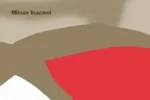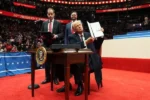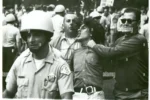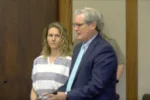Imagine a day when people gather to express their opinions, but things turn dangerous. In January 2021, a big event happened at the Capitol, where some people acted out in ways that led to serious consequences. Fast forward to 2023, a man named Taylor Taranto, who was involved in those events, found himself in trouble again. He was accused of threatening lawmakers and showing up at former President Barack Obama’s home with weapons. Now, he’s asking a court to drop his charges because he believes a special order from President Trump covers his actions. Let’s dive into the details of this unusual case!
| Attribute | Details |
|---|---|
| Defendant | Taylor Taranto |
Understanding the January 6 Insurrection
The January 6 insurrection was a significant event when many people stormed the U.S. Capitol, trying to overturn the election results. This event caused a lot of chaos and danger for lawmakers and citizens alike. It raised many questions about safety, democracy, and the actions of those who participated. The insurrection is often discussed in terms of its impact on American democracy, raising concerns about the future of political protests and the boundaries of free speech.
Many individuals involved in the January 6 events faced serious legal consequences. Some were charged with crimes like trespassing and assault, while others, like Taylor Taranto, have argued their actions should be forgiven due to executive orders. Understanding the legal ramifications that stemmed from this day helps us grasp how it changed the landscape of American politics and law enforcement, especially concerning protests and political violence.
Taylor Taranto’s Case and Its Implications
Taylor Taranto’s case is particularly interesting because he claims that his actions should be viewed through the lens of political satire. He argues that his threats were meant as jokes and that he was acting as a journalist. This raises important questions about the limits of free speech and what constitutes a legitimate satire versus a real threat. If Taranto’s case is dismissed, it could set a precedent for how similar cases are handled in the future.
Moreover, the outcome of Taranto’s legal battles may affect how future protests are policed and prosecuted. If courts start accepting claims like Taranto’s that connect his actions to the January 6 insurrection, it may lead to more lenient treatments for defendants in similar situations. This highlights the ongoing debate about accountability and the legal definitions of political expression in the United States.
The Role of Executive Orders in Legal Defense
Executive orders can have a significant influence on legal cases, and Taranto’s defense hinges on one issued by former President Donald Trump. This order was designed to pardon individuals involved in the January 6 events. Taranto’s lawyer argues that this executive order should also protect him from charges related to his actions in June 2023. Understanding how executive orders work can help us see their potential impact on the justice system and the rights of individuals accused of crimes.
However, the Justice Department argues that Taranto’s actions in June were not directly related to the events of January 6. This situation highlights a crucial point in law: just because two events are linked in time does not mean they are legally connected. The court’s decision will likely clarify how executive orders can be interpreted and applied, especially in cases involving political actions and protests.
The Legal Ramifications of Executive Pardons
Executive pardons, particularly those relating to controversial events like the January 6 insurrection, can have profound legal implications. In the case of Taylor Taranto, his defense hinges on the notion that an executive order from President Trump absolves him of criminal conduct associated with the Capitol riots. This situation raises critical questions about the scope of presidential pardons and their applicability to subsequent actions that may be perceived as linked to those events.
The complexity lies in defining what constitutes ‘conduct related to’ an event that has already been pardoned. Legal experts argue that while pardons can eliminate charges directly tied to a specific incident, they may not extend to actions occurring afterward, especially when those actions involve new allegations. This ongoing legal battle illustrates the challenges courts face in interpreting the boundaries of executive power and accountability.
Assessing the Claims of ‘Political Satire’
Taylor Taranto’s argument that his threats and actions were merely political satire raises essential discussions about freedom of speech and its limits. Advocates for free expression may contend that satire is a protected form of speech, regardless of how offensive or dangerous it may appear. However, the courts often grapple with distinguishing between protected expressions and those that cross the line into incitement or threats, especially in a highly charged political climate.
In Taranto’s case, claiming that he was acting as a satirical reporter complicates the narrative surrounding his actions. While humor can be a powerful tool for critique, it can also lead to misunderstandings about intent and consequence. Evaluating whether his conduct was genuinely humorous or threatening requires careful judicial scrutiny, as it touches on broader issues of accountability in the realm of public discourse.
The Intersection of Criminal Charges and Civil Liability
Beyond the criminal charges he faces, Taylor Taranto is also entangled in a wrongful death lawsuit, which underscores the multifaceted nature of legal consequences stemming from the January 6 events. The civil lawsuit brought forth by Erin Smith highlights how actions taken during political unrest can have lasting repercussions, not only for individuals directly involved but also for families of those affected by violence.
This dual-layer of legal accountability—criminal and civil—illustrates the pervasive impact of the January 6 insurrection. As Taranto’s defense navigates the complexities of his criminal charges, his potential liability in civil court serves as a reminder of the far-reaching consequences of violent political actions. It raises questions about how society seeks justice for not only the actions taken on that day but also the broader implications of political violence.
Public Perception and Media Influence on Judicial Outcomes
The case of Taylor Taranto also highlights the significant role of public perception and media narratives in shaping judicial outcomes. As details of his alleged threats and actions circulate, they create a backdrop that influences how the court, prosecutors, and even jurors may view the case. The media’s portrayal of events surrounding January 6 can either vilify individuals like Taranto or frame them within a context of political dissent, impacting their chances for a fair trial.
Moreover, the media’s focus on sensational aspects of the case, including Taranto’s connection to high-profile political figures, can overshadow the legal nuances that are critical to the proceedings. As public opinion sways, it can complicate the judicial process, raising concerns about whether defendants can receive impartial treatment in an increasingly polarized environment. Understanding this dynamic is vital for assessing the broader implications of legal accountability in politically charged cases.
Frequently Asked Questions
Who is Taylor Taranto and what did he do?
Taylor Taranto is a man accused of threatening lawmakers and carrying weapons near Barack Obama’s home in 2023. He was charged with serious crimes related to these actions.
What happened on January 6, 2021, at the U.S. Capitol?
On January 6, 2021, many people rioted at the U.S. Capitol, trying to overturn the election results. This event led to many arrests and serious charges against those involved.
Why is Taranto trying to get his charges dropped?
Taranto argues that his actions in June 2023 are connected to the January 6 events and claims they should be covered by a pardon given by President Trump.
What does it mean to have an executive order?
An executive order is a rule made by the President that has the force of law. It can direct how laws are enforced or create new policies.
What are the consequences of Taranto’s alleged actions?
If found guilty, Taranto could face serious legal penalties, including jail time for threatening lawmakers and possessing illegal weapons.
What is political satire and how did Taranto use it?
Political satire is humor that makes fun of politics or politicians. Taranto claims his threatening comments were jokes meant to criticize or discuss political issues.
What is a wrongful death lawsuit?
A wrongful death lawsuit is when someone sues another person because a loved one died due to that person’s actions. Taranto is facing one related to a Capitol Police officer’s death.
Summary
The content details the legal case against Taylor Taranto, accused of threatening lawmakers and possession of weapons while near Barack Obama’s Washington, D.C. home in 2023. Taranto’s attorney argues for the dismissal of charges, claiming they relate to the January 6 insurrection, which President Trump pardoned. The Justice Department opposes this motion, stating that Taranto’s June actions are unrelated to the Capitol events. Additionally, Taranto faces allegations of assaulting a Capitol Police officer linked to a wrongful death lawsuit. The court has yet to rule on the motion to dismiss, underscoring the complexity of the case.







